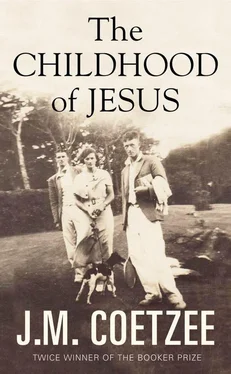‘Doesn’t she want me?’ asks the child.
‘Of course she wants you. You are such a handsome, clever boy, who would not want you? But first she must get used to the idea. We have planted the seed in her mind; now we must be patient and allow it to grow. As long as you and she like each other, it is certain to grow and flower. You do like the lady, don’t you? You can see how kind she is, kind and gentle.’
The boy is silent.
By the time they have found their way back to the terminus it is nearly dark. In the bus the boy falls asleep in his arms; he has to carry him, asleep, from the bus stop to the apartment.
In the middle of the night he is roused from a deep sleep. It is the boy, standing by his bedside, tears streaming down his face. ‘I’m hungry!’ he whines.
He gets up, warms some milk, butters a slice of bread.
‘Are we going to live there?’ asks the boy, his mouth full.
‘At La Residencia? I don’t think so. There would be nothing for me to do. I would become like one of those bees that just hangs around the hive waiting for mealtimes. But we can discuss it in the morning. There is lots of time.’
‘I don’t want to live there. I want to live here, with you.’
‘No one is going to force you to live where you don’t want to. Now let us go back to bed.’
He sits with the child, stroking him softly until he is asleep. I want to live with you . What if that wish comes bitterly true? Does he have it in him to be both father and mother to the child, to bring him up in the ways of goodness while all the time holding down a job at the docks?
He curses himself inwardly. If only he had presented their case more calmly, more rationally! But no, he must behave like a madman, bursting in upon the poor woman with his pleas and his demands. Take this child! Be his one and only mother! Better if he had found a way of giving the boy into her arms, body to body, flesh to flesh. Then memories lying deeper than all thought might have been reawoken, and all would have been well. But alas, it came too suddenly for her, this great moment, as it had come too suddenly for him. It had burst on him like a star, and he had failed it.
As it turns out, however, all is not lost. Just as noon is striking, the boy comes rushing upstairs in a state of great excitement. ‘They are here, they are here!’ he shouts.
‘Who is here?’
‘The lady from the Residencia! The lady who is going to be my mother! She came in a car.’
The lady, who arrives at the door wearing a rather formal dark blue dress, a curious little hat with a gaudy gold hatpin, and — he cannot believe his eyes — white gloves, as if she were visiting a lawyer, does not come alone. She is accompanied by the tall, rangy young man who had so capably taken on two adversaries on the tennis court. ‘My brother Diego,’ she explains.
Diego nods to him but says no word.
‘Please sit down,’ he says to his guests. ‘If you don’t mind using the bed. . We haven’t bought furniture yet. Can I offer you a glass of water? No?’
The lady from La Residencia perches side by side with her brother on the bed; she plucks nervously at her gloves, clears her throat. ‘Will you repeat for us what you said yesterday?’ she says. ‘Start at the beginning, the very beginning.’
‘If I started at the very beginning we would be here all day,’ he replies, trying to sound deliberate, trying above all to sound sane. ‘Let me rather say the following. We, David and I, came here, as everyone does, for the sake of a new life, a new beginning. What I want for David, what David wants too, is a normal life like any other youngster’s. But — it stands to reason — to lead a normal life he needs a mother, needs to be born to a mother, so to speak. I am right, am I not?’ he says, turning to the boy. ‘That is what you want. You want your very own mother.’
The boy nods vigorously.
‘I have always been sure — don’t ask me why — that I would know David’s mother when I saw her; and now that I have met you I know I was right. It could not have been chance that led us to La Residencia. Some hand must have been guiding us.’
It is Diego, he can see, who is going to be the hard nut to crack: Diego, not the woman, whose name he does not know and does not want to ask. The woman would not be here if she were not ready to be swayed.
‘Some unseen hand,’ he repeats. ‘Truly.’
Diego’s gaze bores into him. Liar! it says.
He takes a deep breath. ‘You have doubts, I can see. How can this child whom I have never laid eyes on be my child? you ask yourself. I plead with you: put doubt aside, listen instead to what your heart says. Look at him. Look at the boy. What does your heart say?’
The young woman gives no answer, does not look at the boy at all, but turns to her brother, as if to say, Do you see? It is as I told you. Listen to this unbelievable, this mad proposal of his! What shall I do?
In a low voice the brother speaks. ‘Is there somewhere private we can go, you and I?’
‘Of course. We can go outdoors.’
He leads Diego downstairs, across the courtyard, across the lawn, to a bench in the shade of a tree. ‘Sit down,’ he says. Diego ignores the invitation. He himself sits down. ‘How can I help you?’ he says.
Diego props a leg on the bench and leans down over him. ‘First, who are you, and why are you after my sister?’
‘Who I am doesn’t matter. I am not important. I am a kind of manservant. I look after the child. And I am not after your sister. I am after the child’s mother. There is a difference.’
‘Who is this child? Where did you pick him up? Is he your grandson? Where are his parents?’
‘He is neither my grandson nor my son. He and I are not kin. We were brought together by accident on the boat when he lost some documents he was carrying. But why should any of that matter? We arrive here, all of us, you, me, your sister, the boy, washed clean of the past. The boy happens to be in my care. That may not be a destiny I chose for myself, but I accept it. Over time he has come to depend on me. We have grown close. But I cannot be everything to him. I cannot be his mother.
‘Your sister — I am sorry, I don’t know her name — is his mother, his natural mother. I cannot explain how that happens, but it is so, it is as simple as that. And in her heart she knows it. Why else do you think she is here today? On the surface she may seem calm, but beneath the surface I can see it thrills her, this great gift, the gift of a child.’
‘Children are not allowed in La Residencia.’
‘No one would dare separate a mother from her child, no matter what the rule book says. Nor does your sister have to go on living at La Residencia. She could take over the apartment here. It is hers. I give it over to her. I will find somewhere else to live.’
Leaning forward as if to speak confidentially, Diego gives him a sudden slap across the head. Shocked, trying to shield himself, he is struck a second blow. They are not heavy blows, but they jolt him.
‘Why do you do that!’ he exclaims, rising.
‘I am not a fool!’ hisses Diego. ‘Do you think I am a fool?’ Again he raises a threatening hand.
‘Not for a moment do I take you for a fool.’ He needs to placate this young man, who must be upset — as who would not be? — by this queer intervention in his life. ‘It is an unusual story, I admit. But spare a thought for the child. He is the one whose needs are paramount.’
His plea has no effect: Diego glares as belligerently as before. He plays his last card. ‘Come on, Diego,’ he says, ‘look into your heart! If there is goodwill in your heart, surely you will not keep a child from his mother!’
Читать дальше












